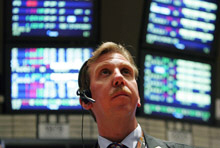
Typical street scene in Santa Ana, El Salvador. (Photo: iStock)
IMF Survey: IMF Examining Financial Sector Tax Options
December 1, 2009
- IMF to prepare report for the G-20 leaders
- Study will examine how to define institutions and activities to be covered
- Will look at range of alternatives, including transactions tax
The International Monetary Fund is examining policy options, including a possible tax on the financial sector, for how governments can recover the billions of dollars in public support used to prop up the banking and financial system during the current crisis, as well as meet potential future costs, IMF First Deputy Managing Director John Lipsky said.

There has been substantial public discussion about advisability of tax on financial transactions (photo : Mario Tama/Getty Images)
MOVING BEYOND THE CRISIS
In a speech in Vancouver, Lipsky said both the general public and financial market professionals were shocked by the scale and scope of public support that has been required to stabilize the financial system over the past two years.
The huge public support helped avoid more serious damage, but the eventual net cost of intervention remains uncertain.
At a summit in Pittsburgh in September, leaders of the Group of Twenty (G-20) industrial and emerging market countries tasked the IMF to prepare a report in time for their June 2010 meeting laying out a range of options countries have adopted or are considering as to how the financial sector could make a fair and substantial contribution toward paying for any burdens associated with government interventions to repair the banking system. A preliminary version will be prepared for discussion at the April 2010 G-20 ministerial meeting.
IMF Managing Director Dominique Strauss-Kahn warned in London last month that there would be no public appetite for any future bailouts. “Let me say that the financial sector should contribute to the cost of the rescue and to limiting recourse to public financing in the event of a future crisis. I suggest this for practical reasons because, in my view, there would not be political support in parliaments for a rescue on the scale we have seen during this crisis.”
Complex issue
"This is a complex and contentious issue,” Lipsky said in his speech at the November 30 event organized by the Bank of Canada. “But despite the acceptance of the idea that deposit insurance is typically paid by a banking levy, this topic up to now has received surprisingly little systematic attention and analysis. In particular, there is an obvious trade-off between introducing more constraining regulation–that could limit prospective risks, but reduce the scope for the financial system to allocate capital–and creating mechanisms to compensate for the potential cost of risk mitigation.”
Lipsky, who is heading an IMF group preparing the report, pointed out that there were two separate issues under debate:
• Whether and how to recoup the costs of the net support already provided
• How to create a mechanism to cope with potential future costs.
“Both issues are relevant and related, but they need to be analyzed independently,” he added.
Knotty themes
Most notably, there has been substantial public discussion about the advisability of a tax on financial transactions. This is often referred to as a “Tobin tax”, reflecting an early 1970s proposal by Nobel laureate James Tobin. Lipsky pointed out that Tobin’s specific proposal was restricted to foreign exchange transactions, and was intended to suppress transactions, rather than to raise revenue.
“While some of the current supporters of a transactions tax intend it in Tobin’s sense, others have extolled such a tax as a potential source of earmarked revenues for a variety of purposes,” he added.
Lipsky said the Fund’s study will cover the issues and options broadly, taking into account both current practices and the available expertise. Included will be the knotty issues of how broadly to define the institutions and/or activities that would be affected, and whether a fund should be created in advance of any future use.
“Avoiding distortions and insuring systemic efficiency and effectiveness will be important considerations in evaluating the options, including a potential transactions tax, among other alternatives," he pointed out.


